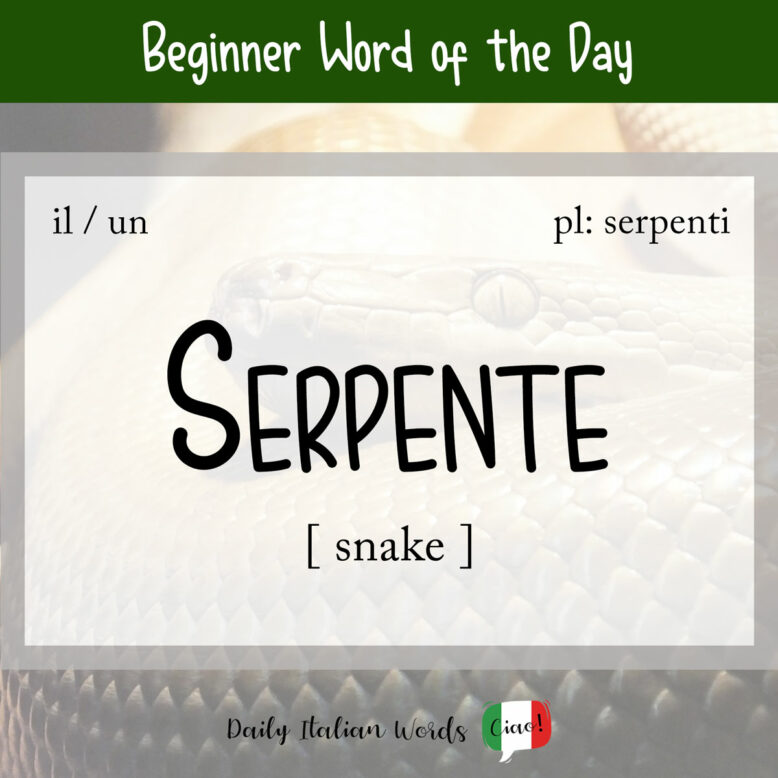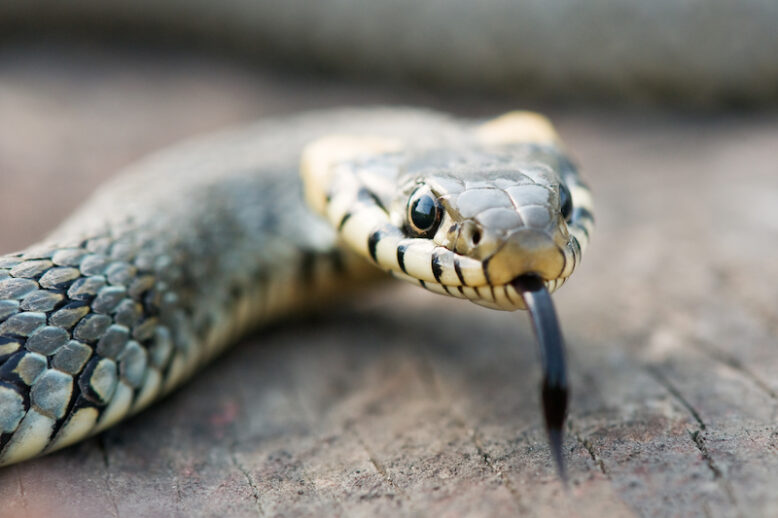The Italian word serpente (snake) should be very easy to remember for English speakers, as it sounds and looks just like the synonym serpent.

Serpente is a masculine noun whose plural form is serpenti. It takes the following definite and indefinite articles:
il serpente
the snake
un serpente
a snake
i serpenti
the snakes
dei serpenti
(some) snakes
Here are a few of the most well-known kinds of snakes:
- serpente a sonagli = rattlesnake
- serpente boa (also just boa) = boa constrictor
- serpente di mare = sea snake
- serpente giarrettiera = garter snake
- serpente dagli occhiali = Indian cobra (lit. the snake with glasses), note that the generic term cobra also exists in Italian (cobra reale, cobra comune)
Note: Grass snakes and water snakes tend to be referred to as bisce or natrici.

It is estimated that around 85% of the world’s snakes are harmless, posing little threat to humans due to their shy nature, but the bite of un serpente velenoso (a poisonous snake) can be fatal if not treated quickly.
Il serpente sta strisciando silenziosamente nell’erba.
The snake is slithering silently through the grass.
Did you know that…?
The largest living snakes are the pitone reticolato (reticulated python), measuring about 6.95m / 22.8ft long, and the anaconda verde (green anaconda), which measures about 5.21m / 17.1ft long. The latter is also the heaviest snake on earth at 97.5kg / 215lb.
Pelle di serpente (snakeskin), or just serpente, is a type of leather that is made from the hide of a dead snake (e.g. borsa di serpente = snakeskin bag).
Just as in English, serpente can function as a derogatory term for someone with a treacherous or deceitful nature.
Non fidarti di lui – è un serpente!
Don’t trust him – he’s a snake!
La fossa dei serpenti (fossa = ditch, grave) not only indicates a hole where snakes can be held captive, but also a dangerous area from which you cannot escape.
Another figurative meaning is a long line of objects connected in a chain, such as un serpente di macchine (a line of cars).
Idiomatic expressions with the word ‘serpente’
Essere un serpente a sonagli
- Literal: to be a rattlesnake
- Meaning: to be a treacherous and dangerous person
Viscido come un serpente
- Literal: slimy like a snake
- Meaning: a treacherous and vicious person
Fare come il serpente che si mangia la coda
- Literal: to do like the snake that eats its tail
- Meaning: to always go back to the same point in a conversation or situation
Heather Broster is a graduate with honours in linguistics from the University of Western Ontario. She is an aspiring polyglot, proficient in English and Italian, as well as Japanese, Welsh, and French to varying degrees of fluency. Originally from Toronto, Heather has resided in various countries, notably Italy for a period of six years. Her primary focus lies in the fields of language acquisition, education, and bilingual instruction.


